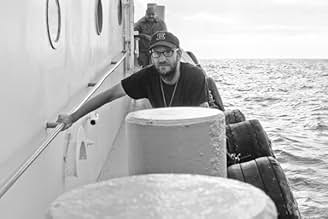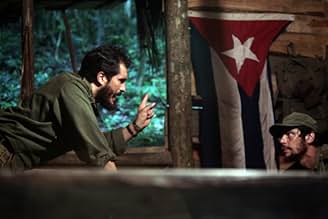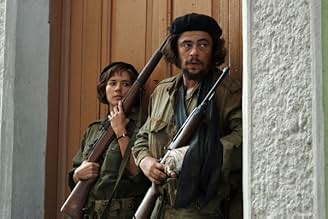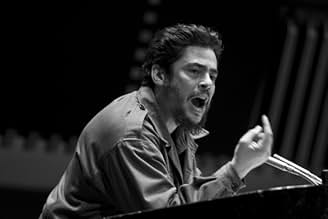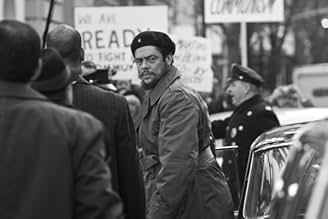1956 में, अर्नेस्टो 'चे' ग्वेरा और कास्त्रो के नेतृत्व वाले क्यूबा के निर्वासितों के एक दल ने तानाशाह फुलगेनसियो बतिस्ता के शासन को खत्म करने के लिए एक सेना जुटाई.1956 में, अर्नेस्टो 'चे' ग्वेरा और कास्त्रो के नेतृत्व वाले क्यूबा के निर्वासितों के एक दल ने तानाशाह फुलगेनसियो बतिस्ता के शासन को खत्म करने के लिए एक सेना जुटाई.1956 में, अर्नेस्टो 'चे' ग्वेरा और कास्त्रो के नेतृत्व वाले क्यूबा के निर्वासितों के एक दल ने तानाशाह फुलगेनसियो बतिस्ता के शासन को खत्म करने के लिए एक सेना जुटाई.
- निर्देशक
- लेखक
- स्टार
- पुरस्कार
- 4 जीत और कुल 13 नामांकन
- Interpreter
- (as Óscar Isaac)
- María Antonia
- (as María Isabel Díaz)
- Fidel Castro
- (as Demian Bichir)
- Héctor
- (as Ramón Fernández)
- Alejandro Ramírez
- (as Yul Vázquez)
- Jorge Sotús
- (as Jsu García)
- Rebel Messenger #1
- (as Luis Rodríguez Sánchez)
- Juan Almeida
- (as Roberto Luis Santana)
फ़ीचर्ड समीक्षाएं
I'll put this film together with Medem's 'La pelota vasca' (an assumed documentary) for they both show an extreme sensitivity working with such delicate themes as like they choose to work. Both originated some contesting, More with Medem's because the director was more rooted in the problem that was shown, and because the story is far from being closed, but to me they were both opened films which, as any contemporary film should be, leave a lot of the thinking to the public, and work as brain starter for discussion.
The narrative structure is effective, the artwork and editing are of great competence. Che in the woods of Sierra Maestra, on the verge taking the power in Cuba inter cut with his visit to the USA, in 1964. This second line is shot in black and white, the other has beautiful colors. The absence of music was a mildly risky choice i appreciated. The rest, you can think of it yourself. I thought Del Toro was very good, internally concentrated, resisted totally to being what we expected Che to be, and that's something, to be able to interpret a character with such an charismatic aura behind him, which we can still feel when his own words are spoken. From this film on, i admire Del Toro; before this i didn't look at him as i do now. I'll review his previews performances, i have to check if i didn't notice how good he is. Quite on the contrary, Bichir, as Fidel, was a total disaster, frankly one of the worst performances i've ever seen. How could he think Fidel was all about imitating a voice, some gestures, and handling a cigar. What a mess.
Of course this man's story is controversial, which means one can make radically opposed opinions out of the same known and accepted facts. The fair amount of arguments i've had since i saw it with someone who saw it with me prove me right here. I think Guevara was a lucid man, who read perfectly well the mechanics of the world of oppression where he stood. He chose to stand there and live like them, though he wasn't like them, and that's worth admiration. The ideas he made of the injustice he saw was a product of a genuine mind. But though the diagnosis was right, the whole process of making it in practical terms was a mess, to my eyes. He was at the root of a regime, inserted in a bigger regime, that grew on arrogance, on hypocrisies, and at a certain point became at least so unfair to the same oppressed people as those oppressed had before. And that's because, though wanting to do different, this revolution used the same weapons of strenght and physical superiority others had used. And that killed the whole idea. And Guevara was there, with it, being oppressive when he thought he was being better, out of, i think, ingenuity. What i say is, read the man, his observations are probably equally (or even more) correct today as they were when he made them, but don't follow his steps, i wouldn't, not knowing what i know today.
Also, notice how Che, the icon, grew to incredible proportions, 3 reasons i give it:
-He died young, and fighting for ideals, at least shooting for ideas;
-He was picked up by the very capitalism he rejected and was sold like an icon the population (mainly youth) desperate to get out of the contradictions in this regime, check the contradiction of this;
-He had an image standing for him, literally an image, the photograph Korda took. It's amazing, and it's probably an unique case, how a single image can move millions, how the right moment, with the right publicity can be so powerful. If you think about that, among the capitalists who sell tshirts and the liberals who believe Guevara, this is image is the center of the most successful publicity campaign ever. Once more, i admire Soderbergh's intelligence to leave that image out of this film. It's more than avoiding a cliché. It's avoiding the viewers to go recall clichés they've made (me included) over that image.
My opinion: 4/5
http://www.7eyes.wordpress.com
Steven Soderbergh refrains, then, from counteracting the magnitude of Che: Part One's dense political platform by ramping up the fireworks. This wont appeal to mainstream viewers. This is not a Cuban Braveheart. This is not some twisted Scarface prequel. There will be no post-movie pop-art. Che: Part One is an intelligent and vital take on the man behind the myth not a balls-to-the-wall action spectacle blaring with blood, bullets and CGI. It's a thorough and naturalistic treatise on iconic human drive and endeavour that infrequently shuttles between monochrome and Technicolor, between Che Guevara's 1964 delegation at the UN headquarters and time spent trudging through the Cuban jungle.
If your understanding of certain political ideals and movements are, at best, hazy- then it's best to steer clear of this one. You're likely are likely to find the first serving of Soderbergh's four-and-a-half-hour, two part political epic a little confusing. This ain't no Hollywood funded, slick and stylish, over-dramatic chronicle concerned with entertainment or income. This isn't 'Defiance' or 'Valkrye'. This is a well-researched, claustrophobic and paced political drama (shot in Spanish) where spurts of action, violence and humour are few and far between. Imagine Oliver Stone's 'Salvador' by the way of Terrance Mallick's 'The Thin Red Line': fragmented, anti-mainstream and very heavy-going.
The bravura Benicio Del Toro stars as Che and is quite excellent. He delivers a focused and unwavering performance worthy of a thousand accolades: his finest since '21 Grams'. The fact that Del Toro is fluent in Spanish also helps, as does a rallying and unknown supporting cast that work well as a low-key ensemble. It's all about Del Toro, though. His insurgent, intense and convincing Che is one marred by crippling bouts of asthma yet defined by a burning desire to educate and reform- to put his litigious beliefs into action and unite Latin America.
With Che: Part One, the diligent Steven Soderbergh has found his blend of realism and narrative, documentary and drama. As an avid Che fan and reader of his books and biographies, there is little doubt in my mind that this monumental work will stand as the first piece in the definitive two part screen portrait of one the twentieth century's most iconic, yet largely uncharted, political figures.
Final Verdict: While lesser films wallow in the limelight, Che: Part One stirs understated in the shadows seemingly content with the fact that it wont appeal to all, or many. Steven Soderbergh has crafted a very loyal and well-made biopic. One that demythologises, one that educates, one that excels and ensues Walter Salle's soul-searching Che preface: The Motorcycle Diaries.
This is not the first time Che's story has been turned into a movie. The 2004 film, The Motorcycle Diaries, examines the formation of Guevara's early politicization, and But Soderberg's film (with Benicio Del Toro in the lead role as Che Guevara), is the first to try and tell the whole story of Guevara's involvement in the Cuban revolution, and his subsequent attempt to spread the revolution to Boliva, where he was eventually caught and killed in October 1967.
Part 1, deals with the fight against Batista. The long hard slog of waging a guerrilla campaign is covered in great detail as a boatload of 82 revolutionaries head for Cuba during November 1956, and the struggle to win Cuba back for the Cuban people begins.
The first film draws extensively on the Guevara's own writings, especially his memoir "Reminiscences of the Cuban Revolutionary War". The months and years of protracted guerrilla warfare are inter-cut with beautifully recreated scenes showing Che addressing the United Nations in 1964, and conducting numerous interviews with a range of media outlets.
Soderberg uses these scenes to explain some of the history and 'back story' to the Cuban revolution, and to give the audience some insight into Che Guevara the man and revolutionary. Part 1 of Che ends in 1959 as Batista flies into exile in the United States, and the revolutionaries under the leadership of Fidel Castro and Che Guevara are about to enter Havana.
Drawing on Guevara's 'Bolivian Diary', Part 2 of Che takes up the story as Che, going under the pseudonym of 'Ramon', lands in Boliva in 1965, and begins trying to recruit local guerrilla's with the intention of overthrowing the ruling government.
Here, his campaign to recruit local peasant farmers fails, and before he and his small band of revolutionaries are able to launch any sort of major anti government attack, they are hunted down and killed with the help of the Central Intelligence Agency.
Che Guevara was wounded and captured on or about October 9, 1967. It is a matter of record that he was alive at the time of his capture, and that he was subsequently shot and killed to ensure he would no longer be able to foment revolution either in Boliva or elsewhere in Latin America. How ironic then that his execution has sparked a 'cult of the revolutionary' that has not diminished over the intervening 40 plus years since his death.
Of course, apart from the Oceans series of films, Soderberg has shown he is socially aware by also directing Erin Brockovich, Traffic (again with Del Toro), and The Good German, so maybe we shouldn't be surprised that he decided to tackle the story of Ernesto 'Che' Guevara.
Don't be fooled by the inclusion of other A-list cast members (Julia Ormond, Matt Damon, Franka Potente, and Lou Diamond Phillips) in Che. All of these actors have minor roles, and small support parts. In fact Matt Damon is on screen for less than two minutes! I can only assume that Soderberg needed some additional well known actors to help secure finance and distribution for the film.
However, this is without a doubt Benicio Del Toros' film. His performance is a revelation. He inhabits the role of Guevara so well, that there are times when I wasn't sure if the historical footage recreated in black and white didn't have the real Che Guevara in them.
According to the program notes, Soderberg is working an a middle part to Che's story. This film will apparently cover Guevara's experiences in Africa. If this is the case, then this trilogy will indeed constitute Steven Soderberg's masterpiece. I can think of no other biopic to rival it, and the finished series should help to keep the legend of 'Che' Guevara alive for at least another 40 years.
If you are patient enough to sit through the over four hours, with an intermission between the two sections, there are rewards. There's an authentic feel throughout--fortunately Soderbergh made the decision to film in Spanish (though some of the actors, oddly enough in the English segments especially, are wooden). You get a good outline of what guerrilla warfare, Che style, was like: the teaching, the recruitment of campesinos, the morality, the discipline, the hardship, and the fighting--as well as Che's gradual morphing from company doctor to full-fledged military leader. Use of a new 9-pound 35 mm-quality RED "digital high performance cine camera" that just became available in time for filming enabled DP Peter Andrews and his crew to produce images that are a bit cold, but at times still sing, and are always sharp and smooth.
The film is in two parts--Soderbergh is calling them two "films," and the plan is to release them commercially as such. First is The Argentine, depicting Che's leadership in jungle and town fighting that led up to the fall of Havana in the late 50's, and the second is Guerrilla, and concerns Che's failed effort nearly a decade later in Bolivia to spearhead a revolution, a fruitful mission that led to Guevara's capture and execution in 1967. The second part was to have been the original film and was written first and, I think, shot first. Producer Laura Bickford says that part two is more of a thriller, while part one is more of an action film with big battle scenes. Yes, but both parts have a lot in common--too much--since both spend a large part of their time following the guerrillas through rough country. Guerrilla an unmitigated downer since the Bolivian revolt was doomed from the start. The group of Cubans who tried to lead it didn't get a friendly reception from the Bolivian campesinos, who suspected foreigners, and thought of the Cuban communists as godless rapists. There is a third part, a kind of celebratory black and white interval made up of Che's speech at the United Nations in 1964 and interviews with him at that time, but that is inter-cut in the first segment. The first part also has Fidel and is considerably more upbeat, leading as it does to the victory in Santa Clara in 1959 that led to the fall of the dictatorship of Fulgencio Batista in Cuba.
During 'Guerilla' I kept thinking how this could indeed work as a quality European-style miniseries, which might begin with a shortened version of Walter Salles's 'Motorcycle Diaries' and go on to take us to Guevara's fateful meeting with Fidel in Mexico and enlistment in the 26th of July Movement. There could be much more about his extensive travels and diplomatic missions. This is far from a complete picture of the man, his childhood interest in chess, his lifelong interest in poetry, the books he wrote; even his international fame is only touched on. And what about his harsh, cruel side? Really what Soderbergh is most interested in isn't Che, but revolution, and guerrilla warfare. The lasting impression that the 4+ hours leave is of slogging through woods and jungle with wounded and sick men and women and idealistic dedication to a the cause of ending the tyranny of the rich. Someone mentioned being reminded of Terrence Malick's 'The Tin Red Line,' and yes, the meandering, episodic battle approach is similar; but 'The Thin Red Line' has stronger characters (hardly anybody emerges forcefully besides Che), and it's a really good film. This is an impressive, but unfinished and ill-fated, effort.
This 8-years-gestating, heavily researched labor of love (how many more Ocean's must come to pay for it?) is a vanity project, too long for a regular theatrical release and too short for a miniseries. Radical editing--or major expansion--would have made it into something more successful, and as it is it's a long slog, especially in the second half.
It's clear that this slogging could have been trimmed down, though it's not so clear what form the resulting film would have taken--but with a little bit of luck it might have been quite a good one.
This battle scene is filmed guerrilla warfare style in an urban environment, with short bursts of action followed by silence as soldiers move into newer/better positions. It all feels very tense and realistic, which makes a nice change to the shaky cam explosion fests that we're used to. This style works well throughout the rest of the film but swaps the city for the jungle.
The flash forward scenes where Che is interviewed and later addresses the United Nations, help to give the story, and Che, more depth and background, whilst giving us insights into his personality and ideology. Along with the battles, these scenes also help to break up the slower parts of the film.
Cinematography in the film is good and occasionally great, with some stunning shots of the Cuban landscape. The black and white scenes are also well shot, without feeling out of place.
On another positive note, Benicio Del Toro does an excellent job portraying Che. He is understated and believable as the man who wanted to change people's lives, focused on doing what he thought was right.
Unfortunately though, I had trouble caring about or even remembering most of the other characters, as dialogue between them isn't particular memorable. Sometimes you almost feel like you're watching a documentary that's trying to teach rather than entertain and this can start to wear, especially when you're reading subtitles. Che may also be shown in a better light than some would like, although honestly I feel the film is fairly accurate in its portrayal of the man and the history.
I'd definitely recommend this film to anyone interested in Che or the events in Cuba. Even if at times things do get a little slow, it's still a rewarding and informative experience.
क्या आपको पता है
- ट्रिवियाFor his role, Benicio Del Toro spent seven years researching Guevara's life.
- गूफ़When the guerrilleros are in the Sierra Maestra, we can hear the coqui (Eleutherodactylus coqui) singing in the night. However, this small frog is endemic to Puerto Rico and the Virgin Islands, thus not possible to be heard in Cuba.
- भाव
Lisa Howard: What is the most important quality for a revolutionary to possess?
Ernesto Che Guevara: El amor.
Cuban Diplomat #1: [translating] Love.
Lisa Howard: Love?
Cuban Diplomat #1: Love of humanity... of justice and truth. A real revolutionary goes where he is needed.
- कनेक्शनFeatured in Así se hizo - Che El Argentino (2008)
- साउंडट्रैकBasura
Written and Performed by Mark A. Mangini (as Mark Mangini)
टॉप पसंद
विवरण
बॉक्स ऑफ़िस
- बजट
- $3,50,00,000(अनुमानित)
- US और कनाडा में सकल
- $7,48,555
- US और कनाडा में पहले सप्ताह में कुल कमाई
- $61,070
- 14 दिस॰ 2008
- दुनिया भर में सकल
- $3,42,09,066
- चलने की अवधि2 घंटे 14 मिनट
- रंग
- ध्वनि मिश्रण
- पक्ष अनुपात
- 2.39 : 1
इस पेज में योगदान दें


